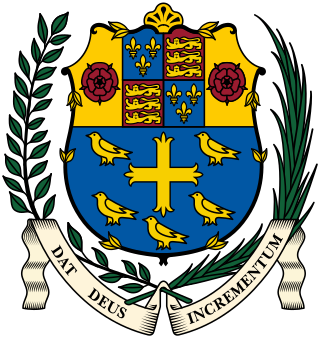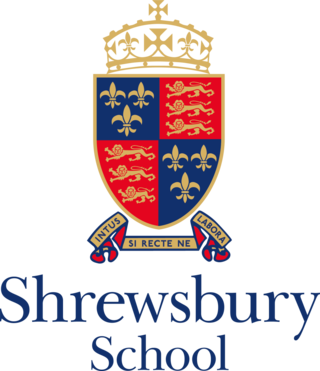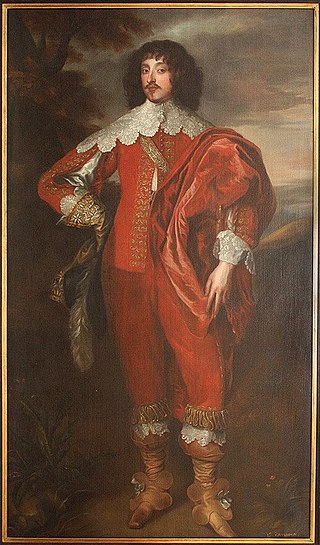The Clarendon Commission was a royal commission established in 1861 [1] to investigate the state of nine leading schools in England, in the wake of complaints about the finances, buildings, and management of Eton College. It was chaired by George Villiers, 4th Earl of Clarendon. The commission sat until 1864, when its report was published with general recommendations on questions of curriculum and governance. The Clarendon Report gives a detailed picture of life in the nine schools. As a consequence of its publication, the Public Schools Act was passed in 1868. [2]
The commission's terms of reference were: "To inquire into the nature and application of the Endowments, Funds and Revenue belonging to or received by the hereinafter mentioned Colleges, Schools and Foundations; and also to inquire into the administration and management of the said Colleges, Schools and Foundations". [3] The nine schools comprised seven boarding schools (Eton, Charterhouse, Harrow, Rugby, Shrewsbury, Westminster, and Winchester) and two day schools (St Paul's and Merchant Taylors'). [4] However, the 1868 act concerned itself only with the seven boarding schools.
In the concluding paragraphs of the report, high praise was given to the nine schools:
It is not easy to estimate the degree in which the English people are indebted to these schools for the qualities on which they pique themselves most – for their capacity to govern others and control themselves, their aptitude for combining freedom with order, their public spirit, their vigour and manliness of character, their strong but not slavish respect for public opinion, their love of healthy sports and exercise. These schools have been the chief nurseries of our statesmen; in them, and in schools modelled after them, men of all the various classes that make up English society, destined for every profession and career, have been brought up on a footing of social equality.... [5]

Eton College is a public school in Eton, Berkshire, England. It was founded in 1440 by Henry VI under the name Kynge's College of Our Ladye of Eton besyde Windesore, making it the 18th-oldest school in the Headmasters' and Headmistresses' Conference (HMC). Originally intended as a sister institution to King's College, Cambridge, Eton is particularly well known for its history, wealth, and notable alumni.

Westminster School is a public school in Westminster, London, England, in the precincts of Westminster Abbey. It descends from a charity school founded by Westminster Benedictines before the Norman Conquest, as documented by the Croyland Chronicle and a charter of King Offa. Continuous existence is clear from the early 14th century. Its academic results place it among the top schools nationally; about half its students go to Oxbridge, giving it the highest national Oxbridge acceptance rate.

St Paul's School is a selective private day school for boys aged 13–18, founded in 1509 by John Colet and located on a 43-acre site by the Thames in London.

Shrewsbury School is a public school in Shrewsbury.

Edward Montagu, 2nd Earl of Manchester, KG, KB, FRS was an important commander of Parliamentary forces in the First English Civil War, and for a time Oliver Cromwell's superior.

The Public Schools Act 1868 was enacted by the British Parliament to reform and regulate seven leading English boys' boarding schools, most of which had grown out of ancient charity schools for the education of a certain number of poor scholars, but were by then, as they are today, also educating many sons of the English upper and upper-middle classes on a fee-paying basis. The preamble describes "An Act to make further Provision for the good Government and Extension of certain Public Schools in England." The concept of a public school therefore predates this Act.

George William Frederick Villiers, 4th Earl of Clarendon, was an English diplomat and statesman from the Villiers family.

Sir George Cornewall Lewis, 2nd Baronet, was a British statesman and man of letters. He is best known for preserving neutrality in 1862 when the British cabinet debated intervention in the American Civil War.

Bradfield College, formally St Andrew's College, Bradfield, is a public school for pupils aged 13–18, located in the small village of Bradfield in the English county of Berkshire. It is noted for producing plays in Ancient Greek and its open-air amphitheatre.
The Rugby Group is a group of 18 British public schools. The group was formed in the 1960s as an association of major boarding schools within the Headmasters' and Headmistresses' Conference. As with the Eton Group, which was formed a few years later, headmasters and heads of the academic departments meet annually in rotation to discuss matters of common interest.
John Charles Villiers, 3rd Earl of Clarendon, PC was a British peer and Member of Parliament from the Villiers family.
Charles Duke Yonge was an English historian, classicist and cricketer. He wrote numerous works of modern history, and translated several classical works. His younger brother was George Edward Yonge.
Cricket, and hence English amateur cricket, probably began in England during the medieval period but the earliest known reference concerns the game being played c.1550 by children on a plot of land at the Royal Grammar School, Guildford, Surrey. It is generally believed that cricket was originally a children's game as it is not until the beginning of the 17th century that reports can be found of adult participation.

The Grove is a large hotel in Hertfordshire, England, with a 300–acre (1.2 km2) private park next to the River Gade and the Grand Union Canal. It touches on its north-west corner the M25 motorway and remains a small part in Watford. The estate is situated within three different settlements; most of the land and all of the mansion itself are in the civil parish of Sarratt, and also in the ecclesiastical parish of Langleybury, while the estate lies within the post town of Rickmansworth.

In England and Wales, a public school is a type of fee-charging private school originally for older boys. They are "public" in the sense of being open to pupils irrespective of locality, denomination or paternal trade or profession.
Edward Balston was an English schoolmaster, Church of England cleric, head master of Eton College from 1862 to 1868 and later Rector of Hitcham, Buckinghamshire, Vicar of Bakewell, Derbyshire, and Archdeacon of Derby.
Villiers is an aristocratic family in the United Kingdom. Over time, various members of the Villiers family were made knights, baronets, and peers. Peerages held by the Villiers family include the dukedoms of Buckingham (1623–1687) and Cleveland (1670–1709), as well as the earldoms of Anglesey (1623–1661), Jersey, and Clarendon. Perhaps the most prominent members of the family were those who received the two dukedoms: George Villiers, 1st Duke of Buckingham (1592–1628) rose to fame and influence as favourite of King James I of England, while Barbara Villiers, Duchess of Cleveland (1640–1709) became a mistress of King Charles II of England, by whom she had five children.

William Villiers, 2nd Viscount Grandison was an Irish peer and Royalist soldier who was fatally wounded during the First English Civil War in 1643.